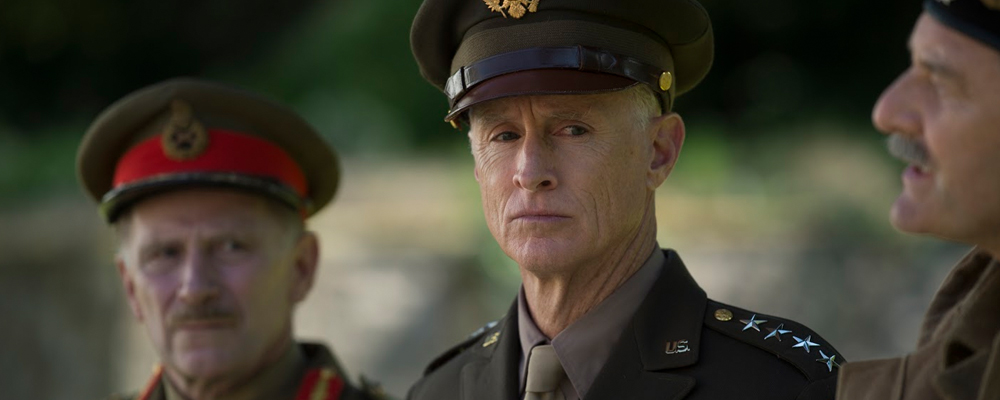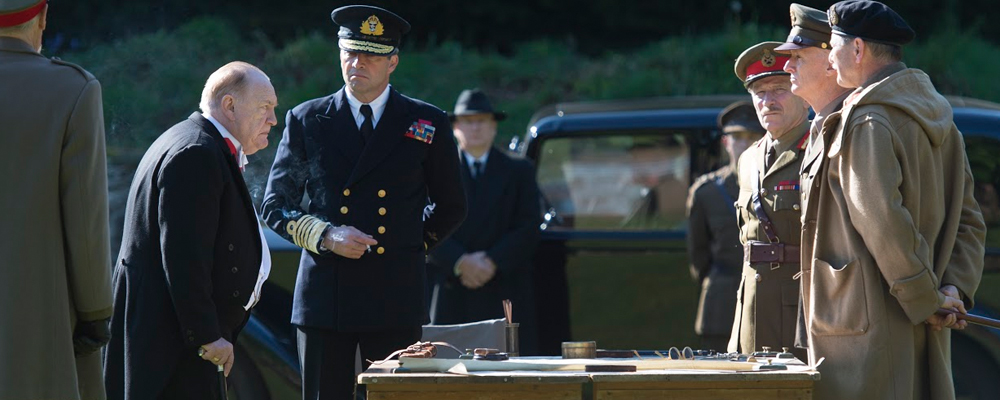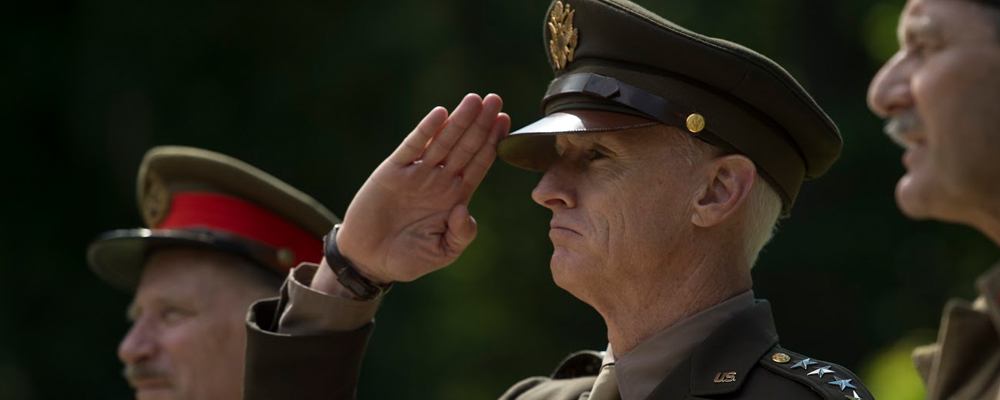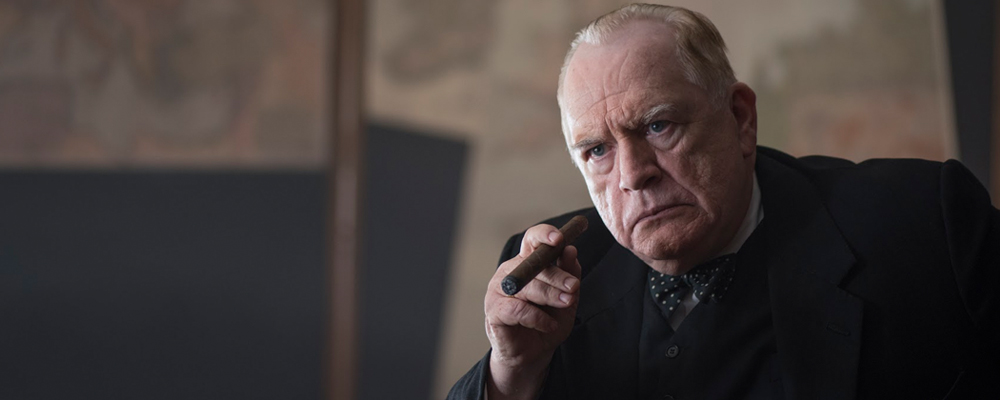John Slattery Talks Stepping Into the Role of Eisenhower in ‘Churchill’ and ‘Mad Men’
Sandra Miska
Best known for playing wisecracking ad agency partner Roger Sterling “Mad Men,” actor John Slattery time travels once again for the World War II drama “Churchill.” This biopic of British Prime Minister Winston Churchill (Brian Cox) focuses on the days leading up to the Allied D-Day landings in Normandy. Feeling guilty and stifled by his being confined to an office, the legendary statesman struggles with those younger men leading the troops on the ground, including a future U.S. President, General Dwight D. Eisenhower (Slattery). Slattery recently opened up to Entertainment Voice about playing one of the pivotal figures behind D-Day, working with Cox, “Mad Men,” and his experiences as both an actor and a director.
What attracted you to this project? Are you a history buff?
I’m a moderate history buff, I guess. I read [the script], and I was surprised they wanted me to even think about playing Eisenhower, so I said, “Alright, I’ll read that.” It just seemed simpler than I thought it would be. Not so much easy, but straightforward and the scenes were playable, and I thought, “Well, nobody really knows what Eisenhower sounded like anymore. If they put some hair and make-up together, I could maybe take a shot at it.” And I wanted to work with Brian [Cox] and Miranda [Richardson]. So I jumped in.
Speaking of Brian, you guys had some great scenes together, particularly the one in the field when you tell him he’s nuts for wanting to accompany the men in Normandy. What was that scene like and what was it like working with him?
He’s great. He’s the sweetest. He was ready. You read the script, you know they go toe-to-toe, and he’s playing Churchill, for God’s sake, so, I did all the homework I could, and I came ready. We shot on that promontory overlooking the bay—in Edinburgh is where we shot it—and it was incredible. We’d try it one way, and then we’d try it another way, and that was kind of the way the whole thing went. You’d take a stab at it and go, “Okay, let’s try it like this. Maybe they’re not actually at each other’s throats all the time.” So, we just experimented with different tones. And then, you know, you leave it up to the director and the editor to work out what they think fits best.
Most of your previous characters, even in dramas, had a more humorous, lighthearted side. How did you prepare for such a serious role?
Well, it’s all there in the script, so there’s really nothing much in the way of not being humorous or anything, because it’s there. There are not really a lot of jokes in the script. I don’t know if it made the film, but there was one scene where Churchill kind of does an end-around and changes [the plan for D-Day]. He makes a speech at the last minute [saying] that they should do this whole thing a different way, and there’s a funny scene after that where I say. “That’s a good speech you made. I wish you would have made it to me a couple of hours earlier.” The scenes were pretty self-explanatory, and we just, like I said, sort of experimented with different ways of doing each one, and when you have enough options, you move on.
There’s a lot riding on Eisenhower’s shoulders here regarding Normandy. He says that victory is the only option. Did you emphasize with him at all? Have you ever been in a situation in your life where you felt a lot was riding on an important decision?
God, not anything like this. I’ve directed a film, and I’ve directed a bunch of television, and there are a lot of people standing around going, “Okay, what are we going to do now?” It’s five o’clock in the morning, and you don’t have enough light to shoot the scene that you need to shoot, and you’re never going to get a chance to come back to this location, so you better make up your mind quick. That’s the heaviest that it’s gotten for me.
The pressure that these men had on them for this to go successfully, it must have been superhuman for Eisenhower to put all those men on those ships—750 ships. Knowing that a lot of them were going to lose their lives. That’s the thing that I can’t imagine. That’s the thing that you have to hope that the director and the editor and the sound and the music can kind of communicate the weight of those decisions.
You mentioned directing, and I know you’ve directed episodes of “Mad Men” and the show “Love.” What was it like making that transition to behind the camera?
It was a while ago I started doing it… I just had been standing around film sets for a long time. I just thought, “Well, I wonder if I could do that?” And then I asked somebody, “Can I try that?” [Laughs]. I wondered in that situation, “What would I do? Would I do this differently?” I was thinking I could do that faster or slower. I just wanted to give it a try. You want some artistic control, and so, that’s how it started on “Mad Men,” and I found my way to “Love.” That’s kind of a different thing because there’s a lot of improv comedy, so it’s a lot more turning the camera on and letting the performers go, and then basically knowing when to turn the camera off.
Do you have a favorite “Mad Men” episode or storyline?
Not really. There were so many good ones. I think my favorite that I directed was called “Signal 30.” The script was really terrific. You’re at the mercy of the story you get to tell, at least in television, and I got a great script. That was my first one. It was pretty good.
Do you have a preference for film or television?
No. I like the variety, actually. That’s what I like about it, going from one to another. I wouldn’t want to do one thing over and over again.
You’ve appeared in multiple projects set in different time periods – mid-century, and now World War II – Is there an era that you haven’t done yet that’d you’d like to do in another film or television show?
No, not really. I don’t really have any definite aspirations. I just sort of find the next thing that I connect to.
“Churchill” opens nationwide June 2.




